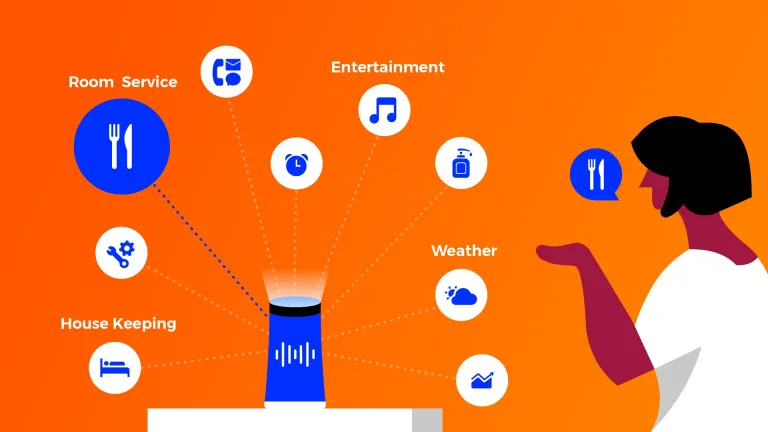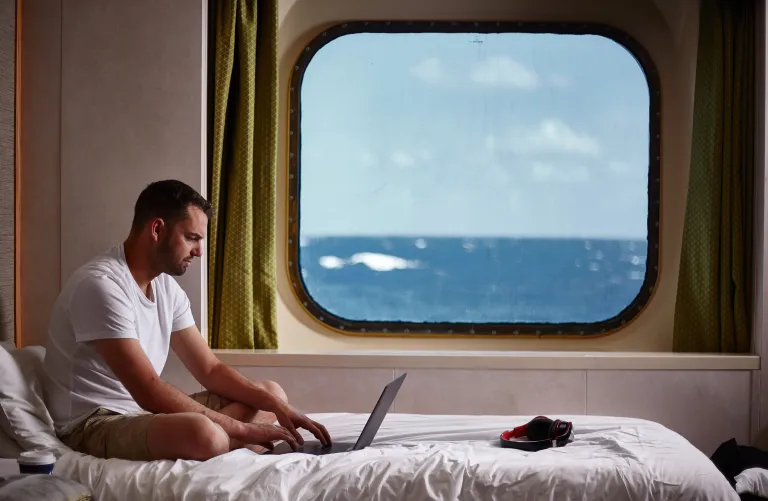
5 Ways Voice Assistants Are Serving Up Better Guest Experiences
Hospitality companies are finding ways to turn potentially frustrating guest experiences into positive ones through branded voice assistants.
Products
Our Platform
SoundHound’s independent voice AI platform is built for more natural conversation.
Solutions
For Every Industry
Find a customizable and scalable voice AI solution for your industry or use case.
Resources
Get the latest voice AI news, keep up on trends, get expert advice, and discover new solutions.


By Karen Scates
Luxury cruise lines are making the transition from floating hotels to smart, interconnected mini-cities. Passengers are now served multiple personalized experiences and customized opportunities to discover and explore. The evolution of the cruise experience over the years from an expensive, weeks-long trip to a 7 to 10 day excursion full of activities and adventures has created an enormous uptick in the number of people embarking on ocean travel. In fact, the number of ocean cruise passengers has nearly doubled in the last 10 years from 17.8 million in 2009 to 30 million in 2019, according to a recent Cruise Lines International Association study.
The cruise industry has changed significantly in the past 10 years as have the people who board the ships. Unlike passengers of the past, today’s travelers don’t want to fully escape the connectivity they have on land. Quite the opposite, and cruise lines are responding with increasingly sophisticated on-board technology — especially voice-enabled interfaces — to meet those expectations. It’s as easy as walking into your cabin and knowing that a voice-enabled personal cruise assistant will immediately start responding to your queries.
Some examples of cruise-specific voice queries include:
Inside the cabins, voice assistants can be used to control the thermostat, turn on the lights, TV and radio, open and close the curtains as well as to ask for extra towels, turn down service and other requests.
“The cruise industry has changed significantly in the past 10 years. Unlike passengers of the past, today’s travelers don’t want to fully escape the connectivity they experience on land.”
Dissatisfied with the limited functionality of the in-room interactive TVs, and the inconvenience of having to keep making phone calls to get information, travelers now expect cruise companies to provide better, faster connectivity. Solutions include in-cabin voice assistants and the ability to interact through voice with other information systems throughout the ship.
Today’s cruise experiences offer several ports of call, and a variety of experiences at each stop. Even the experience of being onboard has changed from playing shuffleboard and lounging to attending a dizzying variety of events and activities designed to delight a wide passenger demographic. The challenge for passengers has changed from trying to kill time in between limited activities, to not being overwhelmed by all the things available onboard and at destinations and navigating their way around giant, multi-deck ocean liners.

Equipping cruise ship voice assistants with a combination of public domains (like weather and points of interest) and custom domains (like restaurants and amenities onboard the ship) ensures that every aspect of the traveler’s experience is enhanced.
“It’s as easy as walking into your cabin and knowing that a voice-enabled personal cruise assistant will immediately start responding to your queries.”
Taking a voice first approach to cruise ship experiences allows the cruise industry to not only meet passenger expectations and delight them at every turn, it also gives them a way to lessen the burden on the crew.
Modern cruise ships are packed stem-to-stern with shops, restaurants, theaters, spas and any number of leisure activities. Navigating the location, hours, and availability of these amenities can be frustrating for passengers who may end up wandering the decks until they find a busy crew member to ask. Providing instant access to a range of information through simple and convenient in-room and on-deck voice interfaces solves a variety of challenges for passengers and crew, while alleviating frustrations.
Instead of returning to the room to view a TV menu of activities or carrying a printout of the day’s itinerary in hand, passengers can stay informed by interacting with a variety of devices onboard via natural voice queries. Onboard voice assistants can be made available in a number of ways including:
Installing interactive devices only solves part of the challenge for luxury liners. The second part of the equation is increasing adoption by ensuring that guests are comfortable using the devices, and that the interactions are natural. Beyond just natural language understanding, voice assistants need to understand the meaning, intent and context of the user query. Voice interfaces designed with the context in mind will create user experiences that delight and are frustration-free.
“Providing instant access to a range of information through simple and convenient in-room and on-deck voice interfaces solves a variety of challenges for passengers and crew, while alleviating frustrations.”
Despite the more obvious benefits, the shift to voice assistants also presents unique challenges for cruise lines, including:
Travelers are choosing cruise experiences as a way to travel to multiple destinations without having to bother with all the inconveniences of traveling from place to place: namely packing and unpacking, checking in and out of hotels, and riding planes, trains and automobiles to get around. Cruises also offer travelers the opportunity to be entertained en route to their various destinations so the journey itself is the destination. It’s no wonder that cruises are growing in popularity.
“The multi-faceted nature of cruise travel is actually one of the greatest challenges when deciding on the functionalities of a voice assistant.”
The multi-faceted nature of cruise travel is actually one of the greatest challenges when deciding on the functionalities of a voice assistant. Voice interfaces in the context of cruising need to be able to perform a variety of customized functions to meet the demands of life onboard the ship as well as provide information and services for travel at each port of call.
An important aspect of the cruise experience is the shore excursions. While many travelers will choose to participate in the excursions available through the cruise line, others will be interested in exploring on their own. Full-featured voice assistants will be able to connect passengers to information about the destination before they arrive. Weather, restaurants, activities and points of interest not included in the cruise itinerary will need to be part of a truly exceptional guest experience.
As with innovative leaders in many industries, cruise ship companies and hoteliers are looking at voice AI solutions that include the functionality of multiple voice assistant interfaces within a single device. The ability to integrate custom wake words and custom domains to address the specifics of hospitality, along with a third-party voice assistant provides broader access to information and functionality.
In the future, perhaps those same devices that provide multi-lingual experiences on the ship will be able to act as translators during local tours. Those types of interactions are probably not that far away and may even already be something cruise lines are working to improve.
Recently, Houndify partnered with HARMAN’s hospitality cloud AI to bring the power of voice to the hospitality industry, including the cruise industry. The solution provides sophisticated, voice-enabled “smart room” experiences for guests. Learn more about how voice AI can help you redefine guest experiences worldwide.

Karen Scates is a storyteller with a passion for helping others through content. Argentine tango, good books and great wine round out Karen’s interests.
Subscribe today to stay informed and get regular updates from SoundHound Inc.